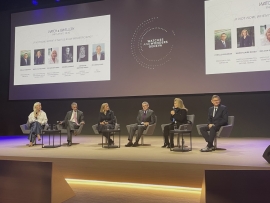WIJI Renews its Commitment to SDGs and Sustainability at Geneva’s Watches and Wonders

Cartier, delegated by Richemont, and Kering launched the Watch & Jewellery Initiative 2030 driven by a common conviction that the UN Sustainable Development Goals (SDGs) and aspirations for a sustainable industry can only be achieved through collaborative initiatives. The global initiative is open to all watch and jewellery players with a national or international footprint. It is committed to a common core of key sustainability goals in three areas: building climate resilience, preserving resources, and fostering inclusiveness.
The Watch and Jewellery Initiative 2030 (WJI 2030) was officially established in Geneva, on April 1st 2022. The announced ambitions of the group was clear: to bring together the global watch and jewellery industry to lead a sustainability transformation with positive and lasting impact in three areas: climate, nature and people.
A C-level panel took place to commemorate 1 year anniversary of the initiative in Geneva at the Watches and Wonders Expo.
The panel titled If not now, when? If not us as an industry, who? was moderated by Iris Van der Veken, Executive Director & Secretary General, of the WJI 2030. The following C-level panelists joined: Marie-Claire Daveu, Chief Sustainability and Institutional Affairs Officer Kering; Cyrille Vigneron, President & CEO, Cartier SA; Frédéric Grangié, President, Chanel Watches & Jewellery; Daniel Klier, CEO, ESG; and Catharina Martinez Pardo, Partner, BCG.
The panel discussed the urgency of accelerating the sustainability agenda in an evolving regulatory and consumer landscape. Different drivers are accelerating transparency. The consumer is looking for trust and purpose, they want a company to demonstrate positive impact. Talent wants to work for a company that embraces true values and inclusion. As ESG regulations continue to evolve rapidly across multiple areas, corporations are navigating ever-more complex challenges around reporting. WJI 2030 also launched its first stakeholder report. Stakeholder feedback has already informed aspects of WJI 2030 governance such as the multi-stakeholder/NGO representation with voting rights on the Board, the necessity of an independent and external risk and compliance committee, the strong focus on establishing a rigorous ESG data framework, and the importance of collaborating closely with suppliers on the ground.
To date, the WJI 2030 has thirty-five members and is advancing towards launching further collaborative action projects around its three strategic pillars: building climate resilience, preserving resources and fostering inclusiveness.
